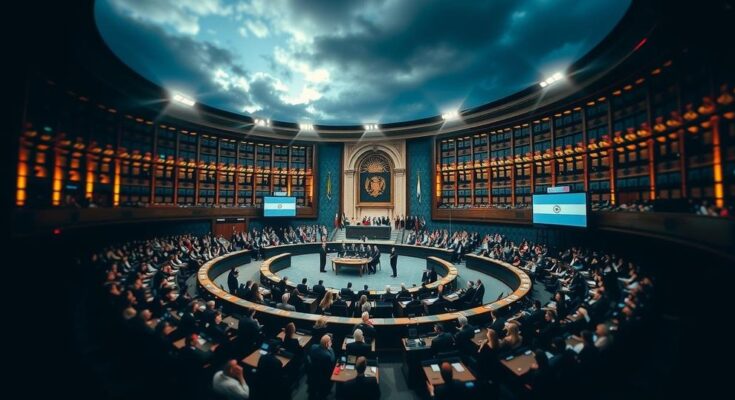Argentina’s UN policies have shifted radically under President Javier Milei, with recent actions including the departure of key diplomats and alignment with US interests. This includes controversial votes against resolutions supporting women’s rights and Palestinian self-determination, alongside a rejection of climate agreements. Milei’s disdain for the UN and drastic policy changes represent a significant turn from previous progressive administrations.
Argentina’s recent diplomatic shifts at the United Nations signal a remarkable departure from its previous progressive stance under leftist administrations. The country’s ambassador to the UN, Ricardo Lagorio, recently bid farewell and retired, amidst sweeping changes instigated by President Javier Milei, who has demanded alignment with his libertarian ideology. This restructuring included the dismissal of Foreign Minister Diana Mondino following Argentina’s controversial vote to lift the US economic embargo on Cuba—a decision that contradicted decades of traditional diplomacy. Milei has articulated his disdain for the UN, describing it as an organization that imposes ideological agendas rather than promoting peace. His administration has initiated a radical reversal of foreign policy, representing a stark departure from prior commitments to human rights and global initiatives such as the Sustainable Development Goals, which he has labeled as a “supranational government program that is socialist in shape.” Furthermore, Milei’s government has aligned more closely with the United States, reflecting a shift in Argentina’s voting patterns at the UN concerning Palestine and women’s rights. For example, Argentina was the sole country to vote against a resolution aimed at ending violence against women online, and it has increasingly sided with Israel on various resolutions regarding Palestinian rights. Lastly, the dramatic withdrawal of Argentina from active participation in the UN climate conference COP29 underscores Milei’s rejection of climate change agendas. These actions collectively illustrate an aggressive pivot in Argentina’s foreign policy under Milei’s administration, moving away from its historical commitments to diplomacy and human rights advocacy.
The backdrop of Argentina’s recent foreign policy changes is rooted in the emergence of Javier Milei, who assumed the presidency in December 2023. His administration marks a significant ideological shift from the previous progressive regimes that emphasized human rights and international cooperation. Milei’s libertarian policies advocate for severe governmental austerity and a departure from multilateral engagements that have characterized Argentina’s diplomatic approach. Furthermore, his administration’s alignment with US interests and rejection of previously endorsed global agreements reflects a dramatic transformation in Argentina’s role on the global stage.
In summary, Argentina’s recent actions at the United Nations represent a significant shift under President Javier Milei, who is moving the country towards a more isolationist stance characterized by alignment with US interests and opposition to long-standing commitments to human rights and environmental issues. This pivot is evident in their voting patterns and the withdrawal from participation in international forums, marking the end of an era of progressive diplomacy.
Original Source: www.passblue.com




